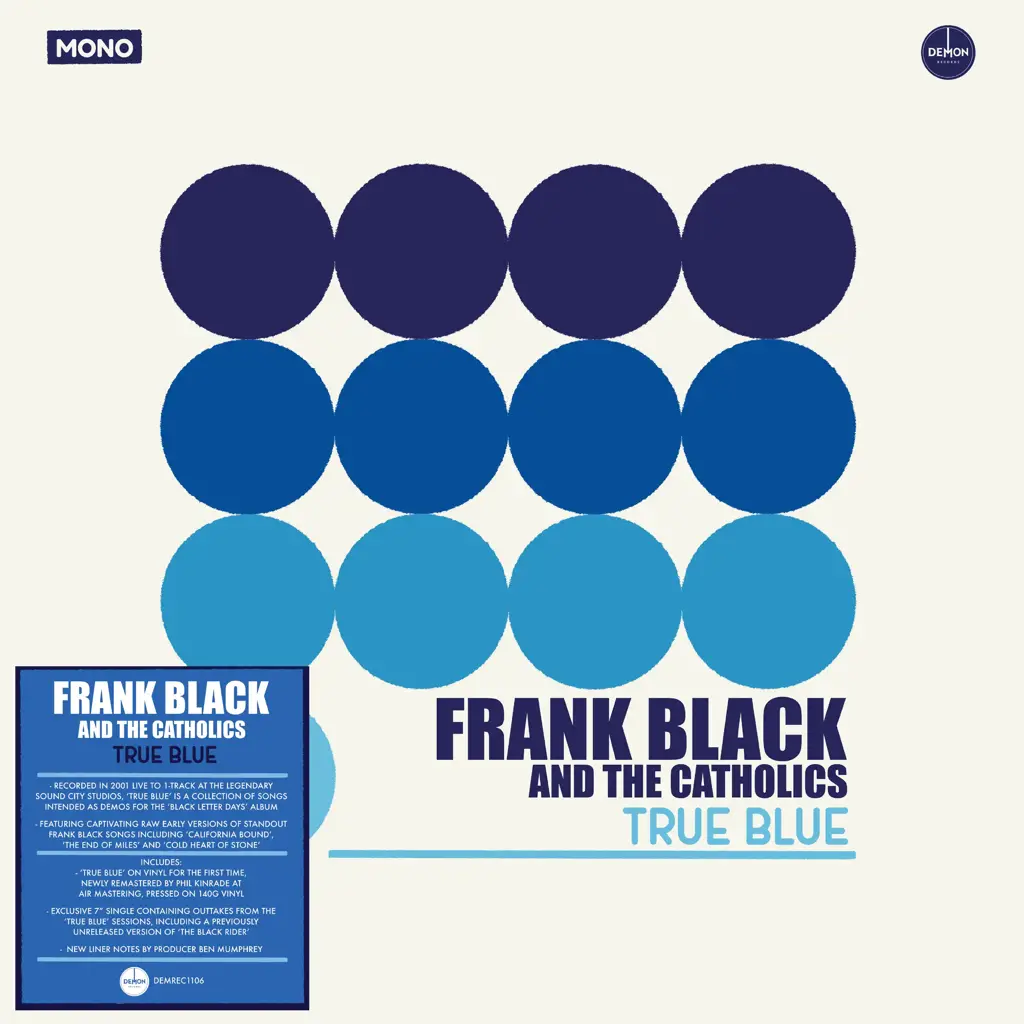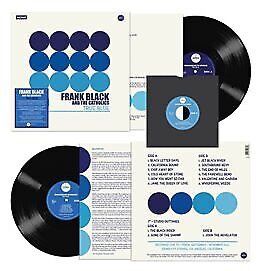
While the twenty-fifth anniversary edition of Frank Black & The Catholics’ eponymous debut was most welcome, it was not a surprise, having been relatively recently issued as part of the fantastic studio collection box set. True Blue, however, is a complete surprise and all the more welcome for it. Recorded in a fashion that makes the other Catholics’ albums look hi-fi, True Blue was recorded live to 1-track tape at the legendary Sound City Studios, with the songs serving as demos for Black Letter Days. As with the other Catholics’ albums, True Blue has been given a sonic overhaul by Phil Kinrade, and is released on vinyl for the very first time, making this something of a must for collectors.
The Package
Demon Records have rather gone to town on this one. Housed in a single sleeve, with a sticker highlighting the salient details, the printed liner contains informative liner notes from producer Ben Mumphrey. There’s also a bonus 7” vinyl, which contains outtakes from the session, including a previously unreleased version of The Black Rider. It’s a generous addition, but make sure you have a centre adapter, as it’s jukebox-style. Finally, it’s worth noting that this is a mono pressing, which serves the songs (and the recording process) remarkably well, allowing the tracks to jump out at you in a very different way to the final album versions.

The Album
Following an earlier track listing than the final Black Letter Days album and omitting a number of tracks including Tom Waits’ The Black Rider (although, this is included on the 7”), 21 Reasons, 1826, I Will Run After You, and, oddest of all, the title track of this compilation, True Blue is a rare opportunity to see the oft-spontaneous Frank Black trying ideas out. Perhaps the closest parallel would be Bob Dylan’s bootleg series in terms of quality, content, and presentation and, for Frank Black fans, it is nothing less than a treasure trove, not least because it features something of a revolving cast of artists who drop in to lend a hand (altogether, twelve named musicians and a mystery drummer played at various stages), recalling the white-hot intensity of Bowie’s Station To Station sessions.
True Blue opens with a ragged take on Black Letter Days and, straight away, it’s easy to see why producer Ben Mumphrey talks of “demo-itis” – these mono cuts have a unique charm all of their own, while the tighter sound afforded by mono makes the album sound unbelievably intimate. The fade-out at the end is a bit of a shame, because it feels like you miss out on the band jamming to the track’s conclusion, but otherwise, it’s a wonderful version of a great track. The slide-soaked psyche-blues of California Bound plays even more like some long-lost oddity from the late 60s, the band playing loose and lively as Frank croons the lyrics. A very rough ‘n’ ready Chip Away Boy has a lo-fi charm reminiscent of Folk Implosion, the stripped back and strangely claustrophobic drums perfect for a track that’s primarily acoustic, the end result being the sort of piece that would gain great attention amongst fans as a hard-to-find b side. Rather more richly detailed is the lovely Cold Heart Of Stone, with its slide guitar and dark bass lines. Superior to the album version? Maybe not, although it’s a tough call, but it’s easy to see why everyone involved would feel so proud of the result. The same could be said of the laid-back take on How You Went So Far Jane, which has a dusty vibe, more akin to that found in some country ranch than in a world-renowned recording studio. The first side then closes with Frank at his most Neil Young-esque, wailing the name “Jane” over and over on the alt-country ballad The Queen Of Love, the track slowly devolving into Sonic Youth noise at its conclusion.
The second side gets a nice lift as it kicks off with the rambunctious Jet Black River, all hard-strummed acoustic and raw lead guitar, although it fades out with unseemly haste. Then there’s Southbend Bevy, which sees Frank trying out a remarkable falsetto. On the album, it sounds like the Rolling Stones, here it sounds like Beck doing the Rolling Stones, and it’s a fun, if frivolous piece. In contrast, The End Of Miles has quite the most beautiful acoustic opening, and the country elements slot perfectly into place. It’s a breath-taking run through of the song, and quite the highlight of the album. Frank stays in country mode on The Farewell Bend, rather more of a pastiche, although the elastic bass line that underpins it sits nicely in this mono mix. The acoustic Valentine And Garuda, which was less effective as side two’s opener on the original album, fits neatly into place here, and the performance is pitch perfect, with layer upon wonderful layer of lead creeping into the mix. It only leaves the album to conclude with the up-tempo Whispering Weeds, which sounds more Dylan-esque than ever in this incarnation.
There is a magic that comes with recording demos. While they may not have the sheen of the final version, there’s very often something special in hearing an artist feel their way through a song for the very first time. Here, we are invited right into the heart of an intimate session, with Frank Black leading an assorted cast of crack musicians, and there’s an argument to be made that this raw, muddled little gem actually eclipses the Black Letter Days album. Sure, it’s ragged around the edges, and tracks fade out, presumably because the band had not had time to work out the endings, but that only makes it more revelatory. With Ben Mumphrey capturing the magic from behind the desk and Phil Kinrade working his usual miracles through mastering, this is not only an absolutely essential companion piece, it’s an essential purchase for any fan of Frank Black, for nowhere else will you hear him quite so raw as you do here. True Blue is an absolute treasure. 10/10



